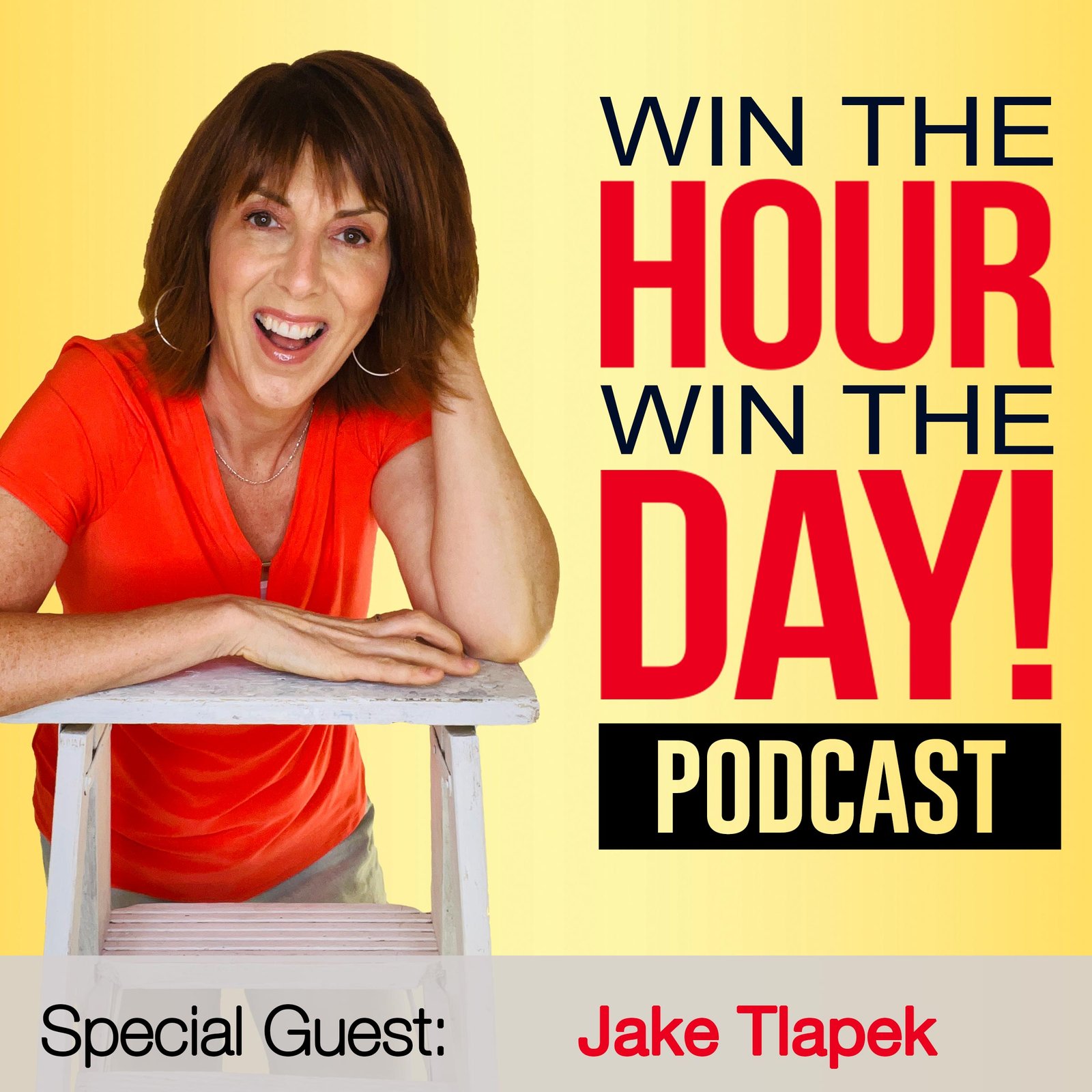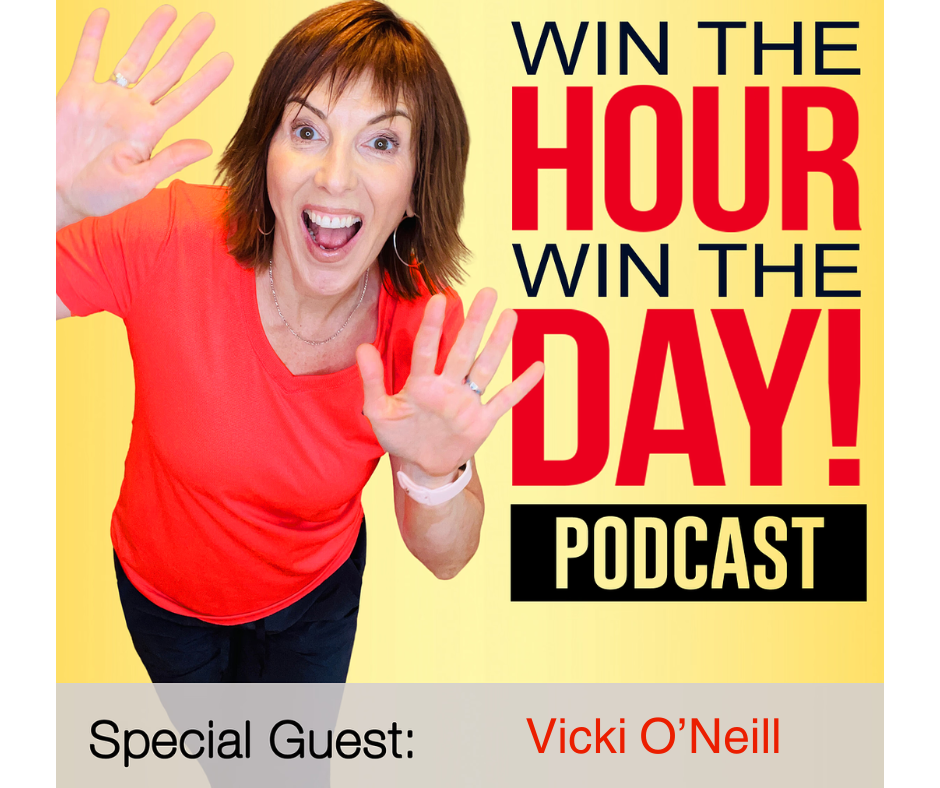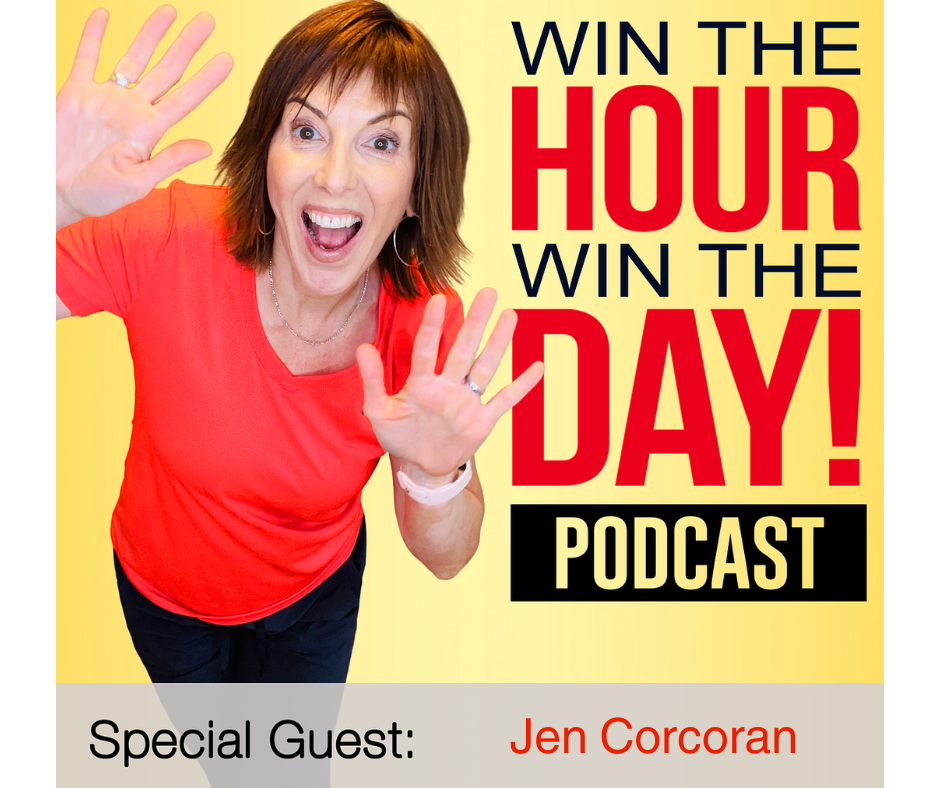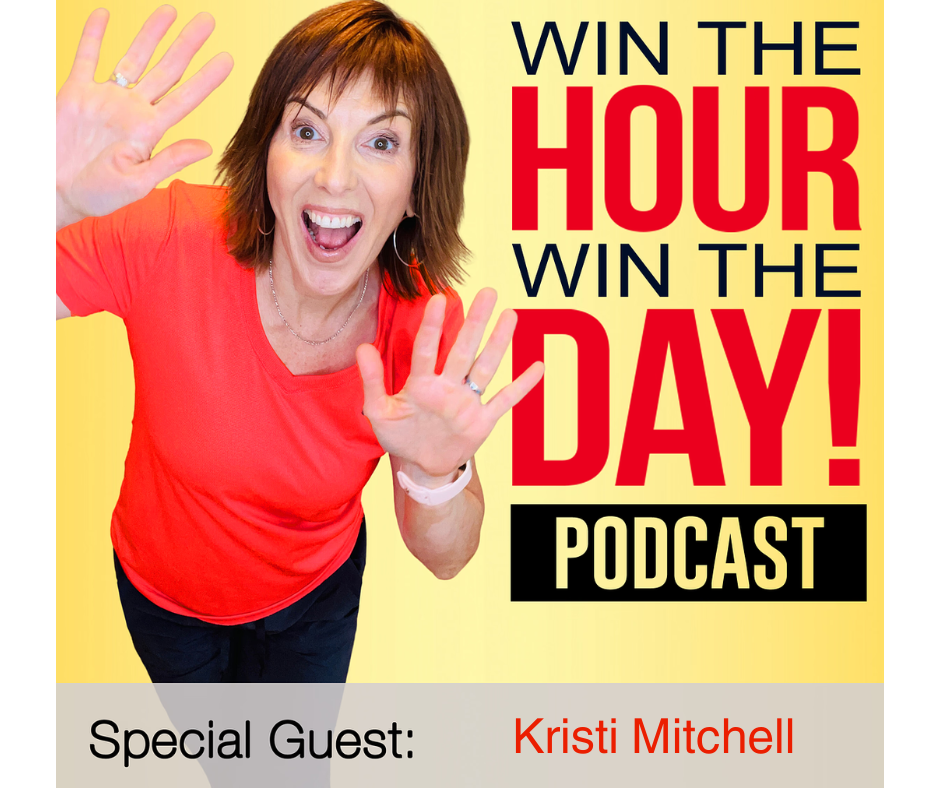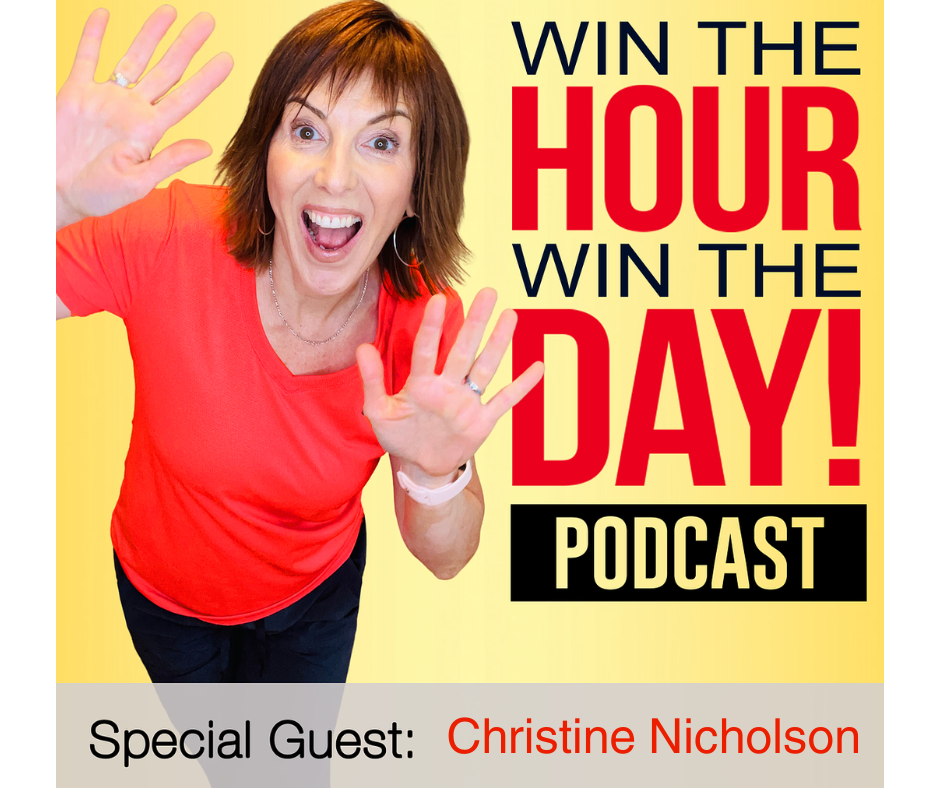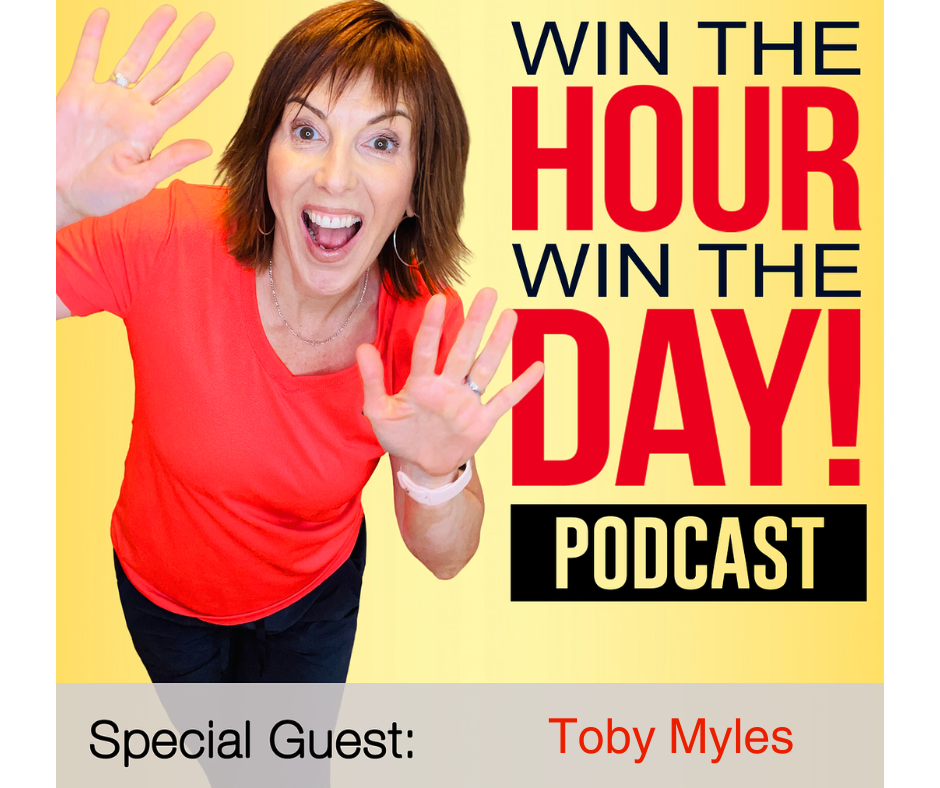Episode Summary
This week’s episode of Win The Hour, Win The Day Podcast is sponsored by Win The Hour, Win The Day’s Signature Coaching Program the Winners Circle. Kris Ward who helps entrepreneurs to stop working so hard interviews, Jake Tlapek.
Join me and the marketing wizard, Jake Tlapek, as we unravel the power of storytelling in business.
In this episode, you’ll discover:
-How stories can turn your business into a customer magnet.
-The secret role of your product/service in the customer’s journey.
-Simple shifts to position your service as the ultimate game-changer.
Prepare to transform your marketing with insights that will make your brand unforgettable.
Tune in now and give your business the success it deserves!
Power Personality Quiz
http://winbacktimequiz.com/
Win The Hour, Win The Day! www.winthehourwintheday.com
Podcast: Win The Hour, Win The Day Podcast
Facebook: https://www.facebook.com/winthehourwintheday/
LinkedIn: https://www.linkedin.com/company/win-the-hour-win-the-day-podcast
Win The Hour, Win The Day Winners Circle: http://t1p.4bd.myftpupload.com/winners-circle-masterclass
You can find Jake Tlapek at:
TikTok: https://www.tiktok.com/@thewizardmarketing
Instagram: https://www.instagram.com/thewizardmarketing/
YouTube: https://www.youtube.com/@thewizardofmarketing
Facebook: https://www.facebook.com/thewizardmarketing
Win The Hour Win The Day
http://t1p.4bd.myftpupload.com
Jake Tlapek Podcast Transcription
[00:00:00] Kris Ward: Welcome to another episode of Win The Hour, Win The Day, and I am your host, Kris Ward. And today we have Jake Tlapek in the house. He is known as the wizard of marketing. And let me tell you, he does so many things well, and I’m super excited to have you to the show, Jake. So welcome to the show. And as I said to you, when I first reached out to you, yes, I reached out to him.
[00:00:22] We have a waiting list. I reached out to him. I said, you make SEO and website stuff. You gosh, you make it almost interesting and fun and it can be incredibly dry. So I thought you’d be fun to have a chat with and we’re going to talk a little bit about SEO and then we’re going to dive into bigger marketing strategies and where to go next. But first off, welcome to the show, Jake.
[00:00:43] Jake Tlapek: Thank you so much for having me, Kris. I really appreciate it.
[00:00:45] Kris Ward: This is It is going to be a blast. Okay, let’s cover, we’ve had other people, it is technical information. So as brilliant as you are, the SEO stuff is going to be somewhat similar because we’ve had other SEO people here before, but let’s just, highlight some of the things that we do need to be mindful about our website and then let’s dive deeper and really get into it. So where would you like to start?
[00:01:07] Jake Tlapek: Oh, that’s great. So just quick on me, I built my business on SEO. So SEO is a sweet spot in my heart and my mind as far as a marketing strategy. And when we’re talking about SEO, I always come back to the three things that are always prevalent in SEO, which is the technical SEO that’s making sure you did it right.
[00:01:29] Okay. Then there’s the content, making sure that you did it valuably. And then there’s the third, which is the off site SEO, which is, am I spreading the news? And that’s the easiest way to think of it is you, if you break your SEO down into those three kind of buckets, you can start to attack your SEO plan more effectively.
[00:01:49] Kris Ward: Okay. And what do you feel in each one of those categories that we miss the most?
[00:01:54] Jake Tlapek: Oh, that’s a great question. So I would say in the technical space there, there’s such a slew of things, but the one thing that jumps out at me a lot for a lot of business owners is that they choose a very cheap hosting service for their website.
[00:02:10] There’s a lot of hosting services out there. A lot of them have very great pricing, but sometimes you’re not getting the full value that you could out of your hosting service. And what happens is it slows down your website load time and that impacts your SEO. So what I like to say is make sure that your host is not holding back your SEO.
[00:02:33] I don’t want to point too many fingers, but if you’re on a GoDaddy or a HostGator or a Bluehost, evaluate your program and make sure that you’re getting the highest value out of your hosting and that you’re not being impacted negatively by your load speeds. Okay. That’s the biggest technical thing.
[00:02:50] Kris Ward: Hold on. Back the truck up. Beep. All right. So not my area of expertise. So I would never, I thought I’m… we’re with GoDaddy, so I thought, okay, we’re with one of the big boys or girls. And so I’m done because I’m dealing with them. I’m not dealing with, and I thought the… for lack of better word, the mom and pop shops of hosting was to the wayside when GoDaddy, dominated the frontier.
[00:03:19] I’m misunderstanding that. I really just didn’t think that I’m dealing with GoDaddy. That’s it. It’s like I went and got stuff at Walmart. They’re the big chain. What else do you want from me? Now, not to get too technical, but there’s different packages or things that I’m not asking the right questions?
[00:03:34] Jake Tlapek: Ab… well, potentially. Okay. Not to get too technical, but hosting is a different type of each is a different type of building. All right. Okay. You can have an apartment building with lots of little websites all over it. All right. Each one of those little is a website. And that’s the most common thing that GoDaddy and these big services sell is these big these cheap servers with lots of people on them so that you can get your website out there.
[00:04:00] And it’s great for getting started out because the cost is so low. But as your business grows, as you get more bandwidth, more visits, more traffic, you’re gonna want to increase the size of your hosting too so making sure that you have enough bandwidth to handle your traffic and load your website effectively is an important factor.
[00:04:25] And a lot of these services you get on, you’re paying 10 bucks a month, 12, three bucks a month for some of these hostings and they’re piling you in these servers. One day, one of those guys has a great day, slows down everyone else on the server. And now you just suffered because you’re sharing all of that space with them. So as your site grows, your hosting should grow too.
[00:04:47] Kris Ward: Okay, I did not know that. And I thought we were going to be feeding stuff here with the SEO guy. So what am I asking for? I guess it’s to me, I’m thinking it’s like almost like a cable package. It’s oh, I thought I had all these channels, but I only have eight.
[00:05:01] So when I’m calling to verify or to ask, cause I don’t know what I don’t know, what is even the sentence that I should be using to check on this?
[00:05:10] Jake Tlapek: I would recommend that there are three things you’re looking at. Three stats you want to be asking about. One is processor speed, and that’s going to be really nebulous.
[00:05:21] I don’t want to dive too much into the technical details, but basically bigger number, the better here. Okay. Okay. Bigger number, the better. You’re also looking at storage space. That’s an easy one. How many gigabytes can I put on the site? So if you have a very image or video heavy website, you’re going to need more band, more storage space.
[00:05:46] And the last piece, and this is the real trick here, is the bandwidth. A lot of services will guarantee a minimum bandwidth of X number of gigabytes a month or megabytes a month, depending on how big your hosting package is. And again, if you have a heavy video site or you have a lot of pages that people are navigating through and loading, you’re using up more and more of that bandwidth.
[00:06:11] So those would be the three things that you could be looking at. Once you hit a certain level, like I would say, If you’ve been running your website for five or six years, you should start to consider getting what we would call a private server. And that’s where you own the whole thing. It’s basically a computer out in cyberspace that you own the whole thing. And that’s where your website lives. It’s like a single family home.
[00:06:33] Kris Ward: I had no idea. I thought because you would GoDaddy, it’s like I’m not taking the short route. I’m dealing with… It’s if I’m getting a phone, I’m going to pick maybe from Apple or Google. I’m not going to go to Steve’s new phone shop, right?
[00:06:47] And get his new invention. So I thought GoDaddy meant I was with like, that I was getting everything that any big box company could give me. I had that backwards. Okay. Let’s make
[00:06:58] Jake Tlapek: Be practical. Let’s make it practical. Okay. How can, how do I know if I need a better server? There is a free tool you can go to called gtmetrix. com. Okay. It is a speed testing site. They’ve got servers all over the world to test the loading speed of your websites. And you just punch in your URL there, and it’s going to give you a report back of how well you loaded your websites. Some of the things on that list are going to be things you need to control, such as image sizes, or if you have forms on your page, or maybe your wordpress isn’t updated and optimized, whatever that might be, it’s going to tell you those, but it will also tell you things like, server response times.
[00:07:45] And if you start to see any issues that are server response times or bandwidth limitations, it’s probably time to start looking at a new hosting option.
[00:07:57] Kris Ward: Now we have, I have I’m, this is not my area of expertise in any capacity, but I do know about different sites that test your speed. And I thought that was 100 percent on us.
[00:08:08] Okay, we have to, compress the images, we have to do this, we had to do that. I didn’t know that we were also assessing the service capability. Okay, not to get techie here, and I don’t want to put you on the spot and scare us, but what is the price range when we’re looking at a private server? Is there a reason we… none of us are doing that? Because is it.. I’m going to be scared?
[00:08:32] Jake Tlapek: It, it wouldn’t be terribly scary. Okay. If you find an agency that is able to support you, so I would first ask your marketing agency if they have any recommendations. That’s the first place to start. But outside of that, if you’re just hosting with one of these major hosting services look to see if they have any higher guaranteed bandwidth packages or anything that’s labeled as a private server.
[00:09:03] Okay. You could be looking anywhere from the $40 to $70 mark per month. Okay. Or if you’re going for the high ritz luxe deluxe package, you could be looking in the couple hundreds. But again, I wouldn’t make that jump all in one go much buying a new home, scaling up the size you want. Do so the same with your hosting.
[00:09:30] Kris Ward: This has been enlightening because I would have thought a private server is really like having a private plane. I would have been thinking like, excuse me, my company, what do I need a private server for? I would think that was something like, I don’t know, like Apple needs a private server, not me.
[00:09:44] So that is information we never got before. I guess that’s why you’re here. All right. Okay, so that was valuable. Some big mistakes we’re making with content as far as missing the boat.
[00:09:57] Jake Tlapek: I would say the biggest mistake about content and we’ll talk a bit more about this in a moment. I think this is where the conversation is going to end up leading, but ultimately the biggest mistake with the content that people are making right now is we’re not focusing on developing content that’s helpful for the reader. Too often we’re focusing on developing content that’s helpful to our search capabilities. Meaning that we’re building a page for Google to look at it and go, yep.
[00:10:30] You’re the result that I should show for whatever this page is about. And we need to take a step back from that and really think about the user experience. And there’s two major reasons. Okay. One, we’re going to develop a relationship with the reader. That’s what our business is trying to do.
[00:10:51] That’s what our website’s trying to do, is develop a relationship. And that’s conversation. If we’re just throwing a bunch of technically worded sentences that don’t bring any real value to the reader, they’re going to exit, they’re going to leave. Which leads to the second piece, which is Google and all the search engines objectives is they want to display some search results, have people click the very first result, and never come back. That is 100 percent success by Google doing Yahoo.
[00:11:27] Kris Ward: Okay, hold on. I got lost there. Back up for a sec. So on one hand, what you’re saying is, I get it. You’re saying SEO stuffing. We don’t want to just be having academic words with all the right verbs and things in there so that we can say yes.
[00:11:41] We needed to re… people often talk to us about productivity, but we’re really about your team and super toolkits and outsourcing. And getting you 25 hours back a week, blah, blah, blah. But if I’m keyword stuffing and just making sure I use the word outsourcing every time I can, when in fact, that’s a key word for us, but we really believe so much more.
[00:11:59] It’s about building your team. Outsourcing is the word that everyone else is searching. But that’s also what I think people do wrong is they don’t even know how to actually build a team. So we need to make that engaging, likable, interesting to the reader instead of just trying to fill our SEO quota with Google.
[00:12:17] So that’s point number one, right? Okay. So then what you’re saying is. If Google gets excited, if we do a search and then we get all the information from that website result, whatever, winthehourwintheday.com, they come and they get everything so much to the point that they never have to come back because their belly’s full. They don’t need to come back. They that’s it.
[00:12:41] Jake Tlapek: No, sorry. From Google’s perspective, so Google shows you 10 results for let’s say outsourcing is the search term. The number one result is winthehourwintheday.com if I click that. And I go there for five minutes or two minutes or whatever it is, and then I come back to go Google and click the second one. You failed.
[00:13:03] Kris Ward: Okay. That I got, I thought when you said it, I’m so ap, I apologize. I thought you were saying that I will go to winthehourwintheday.com, get my information, and I should never have to come back to winthehourwintheday.com. I should have been able to get it all in one sitting.
[00:13:15] I see. Okay. I’m glad I care for I got that confused. Okay. Yeah. Your way makes more sense.
[00:13:20] Jake Tlapek: From Google’s perspective. They failed. They want to be a… cons.
[00:13:27] Kris Ward: Shouldn’t, you shouldn’t have to ask me twice if I asked a question. Google should be able to answer and you shouldn’t have to ask ’em twice.
[00:13:35] Jake Tlapek: And if they, if you did have to go back to Google and click the second, third, or fourth, now Google’s going that first one wasn’t good enough. I’m gonna move that down. Oh, okay. The second one wasn’t good enough. I gotta move that down. The fourth one, they clicked. Never came back. That one might need to go up, I’m going to test it.
[00:13:49] And so that’s how Google is adjusting their rankings. If we make content that engages people, answers their questions, and gets them to where they want to go, they won’t go back to Google. Google will go, hooray, they never came back. We did it, boys. High five. That was the winner. And now you just solidified yourself for whatever SEO you wanted to actually show up on.
[00:14:13] Kris Ward: Okay, that is simple, but I think profound. I think a couple of things that I got from that was one, nothing is guaranteed or owned. So you could be, Oh my gosh, I’ve arrived. Look, my, my website comes up first in the search. This is it. Our day is here. Blah, blah, blah. But that can change in an hour and in a day, whatever, because it gets forever evolving.
[00:14:36] And then the other two is, I know people say this all the time, but I heard it differently from you is now I have to make sure, in my case, a lot of people very few understand what the problem is. What happens is my ideal client often thinks, Oh, you know what? I’ve been, I’m doing well in business. I’m making money.
[00:14:57] I should be appreciative. I should be grateful. Once I get past this next thing, Oh, I just have to get this new online thing out or I’m just getting my book out. I’m just starting my podcast or you don’t understand, whatever. And so then they’re struggling with burnout or they think, Oh, they’re just not focused, or they’re not disciplined, or maybe they need more of this.
[00:15:15] And really it’s just, they’re lacking some basic strategies because a business means that anything could happen. There’ll always be changes. There will always be something. You’re always going to have a new ambition. So that shouldn’t be any reason to derail you like at all. We had a… our social media manager a couple of years ago, two weeks before Christmas found out when all the lockdowns just stopped that she got accepted from the Philippines to go to Canada for school.
[00:15:39] So we had a week before Christmas, we found someone new because we got this 12 point hiring process and we brought on Maura and she was up to 80 percent capacity because of our super toolkits. We could do that and you should all be able to do that.
[00:15:52] But so many people are looking for…. they might be, how to avoid burnout, how to be more productive, how to get more time in the day, which is them blaming themselves. So I might need to be answering those questions and really speaking their language instead of just talking about outsourcing. I have to make sure it’s like, Oh, this bucket of problems I think they have where they’re blaming themselves is not the issue and making sure that those stories, those blogs and everything are digestible and interesting and hit those points that they think they have.
[00:16:25] Jake Tlapek: Absolutely. And that’s actually like the most perfect transition ever to talking about content structure and my methodology internally, which we call it sell the sword.
[00:16:38] Kris Ward: Okay. I’ll warn you if you call anything I do perfect, you will be back for another show. So continue to sell the sword.
[00:16:44] Jake Tlapek: So we use a methodology to write and create content websites. We call sell the sword. And the idea behind it is this. As long as there have been people, there have been stories, and stories follow one basic model. There is always a hero, who is on some sort of journey, and that journey is going to take them from where they are today to some other place. And that some other place might be a physical place. It might be a mental or spiritual place. It could be into the presence of a beautiful princess. There’s lots of different places that can take. We call that the prize. All right. You have the hero and the hero wants the prize.
[00:17:27] And always in between the hero and the prize is the dragon. The dragon is merely an obstacle. This could be the foe. It could be the journey itself can sometimes be the dragon. Okay, but if you want to take it in the classic fantasy sense, there’s a dragon in the way. It’s the problem. And the hero must overcome that dragon, this is where things get interesting because the hero isn’t enough at the beginning of the story. They need something else that’s going to change the game for them so that they can defeat the dragon and we call that the sword. Okay, and normally if you want to think of it, I’m big Star Wars fan.
[00:18:13] So Obi Wan Kenobi shows up to Luke Skywalker and says, here’s this lightsaber and you’re going to take that and defeat or Super Mario needs the mushroom to grow and get bigger so that he can defeat Bowser and and these are examples of what the sword is. And so from looking at that from a marketing perspective, specifically for your own business, too often we position our business or our product or our service as the hero. We. How often have you been to a website that says, we do X.
[00:18:51] Kris Ward: Okay.
[00:18:51] Jake Tlapek: Yeah. And it’s great except for one problem. The person who’s reading that, who’s consuming that, experiencing that what part are they in the story? They’re the listener. They’re the villager who watches the hero go out and save.
[00:19:07] There’s no attachment. There’s no emotion. It’s Oh, thanks. Bye. Okay. I’m not involved. Okay. That doesn’t help me as a business owner. Okay. Even though my product is amazing, it doesn’t help me. So sometimes business owners will place the product as a, as the price, Hey, all you need to do is get this.
[00:19:27] And the only thing in between you and getting our product is a simple payment of 19. 95, and while there is a different approach to that, cause we are now taking the user or the reader and putting them in the story. They’re now the hero, but we’ve positioned ourself as the prize that they have to go in work to get, and people don’t want to work and version to work is a huge selling point, right?
[00:19:52] A lot of what we buy keeps us from doing work. So we don’t want to position our product or service as the prize. It only leaves two other things in the story, and we certainly don’t want to be the dragon. Okay. If we can re conceive our product or service as the sword, the thing that augments our reader the hero, to slay their dragons and achieve the outcome and the prize that they want.
[00:20:22] Now the decision is no longer, do I buy your product or service? The decision is now, do I want to defeat this dragon and get the prize? And that is a totally different mindset to sell from, because now it, there’s nothing you have to explain or overcome. You’ve already set them on the path. They want the prize. They want to beat the dragon. Here’s the sword.
[00:20:49] Kris Ward: Okay. So in my head, it sounds like the same thing, only different. So I’m sure I’m getting this wrong. So again, we are, I already described what my ideal client is. So then if I’m making them the hero and I am the sword, I got that so far, right? Okay. So then is it the burnout they’re facing?
[00:21:14] Is it they can’t scale? Is it they’re working too many hours? I don’t see. I think I just, to me right now, I’ll tell you is it sounds like my story would be the same. It’s just, you’re labeling one part different than the other. So I’m lost.
[00:21:28] Jake Tlapek: So the difference is what do you talk about? Okay. What is the bulk of your content?
[00:21:34] So we can describe the sword. It’s shiny. It’s sharp. It’s long, it’s easy to carry, it has a holster. Those things aren’t interesting to me as the hero. I could care less if it’s a sword, this sword or that sword. But if you can define the problem and show me the future where that problem is gone, the dragon removes the prize available to me.
[00:21:58] Okay. And position the sword is simply the token you have to pick up to get that. That’s the magic. So I’ll give you a perfect frame. All right. Okay. For your business for Win The Hour Win The Day. Business owner burnout is a struggle, okay? What is the prize that they want? What is that pain making them want?
[00:22:21] They want to work less hours and enjoy their life. That’s the prize. Yeah. That’s the end goal. Yeah. So what’s the dragon in between? It’s not the burnout. The burnout helps us identify the prize, okay? Yeah. The dragon is, I don’t have enough hours in the day. I don’t have enough people I trust to work with me. I don’t have the processes in place to streamline my operation.
[00:22:49] Kris Ward: I don’t know how to hire, who to hire.
[00:22:50] Jake Tlapek: I don’t know, exactly. You know all of these points already. Yeah. Okay? Yeah. These are the individual dragons. Okay. So now you sell in order to get the prize, in order to not be burned out and enjoy your life, you need to learn how to hire better.
[00:23:09] You need to create a checklist. You need to trust your employees to get the job done. You need to have a process that saves you three hours a day. Those are the things that need to be overcome. The sword does all of those things. The sword will take care of that. So now, if I take the sword, the dragon goes away. And the only pathway is from me being the hero of what I want to the reality of the future that I desire.
[00:23:37] Kris Ward: Okay. So a couple of things. So we, some of us may by dumb luck had these things in the right order, but I think what’s really important is in order to replicate that or anything business scale on it to understand here’s the four pieces of my story and make sure that I’m labeling them correctly.
[00:23:53] Also I would to dive a little deeper. In the winner’s circle, we do find hire and on board for you, your team members, but we do also, we do everything for either with you to, for independence or for you for speed. So the first hire we, or the first couple, and I do believe in small teams, so you may only need two people, but we can do that for you.
[00:24:12] No problem. But I will also show you and tell you how we do it and how we get a 90 percent retention rate. So you can years later, do it yourself. Fine. So in that case is the sword me saying, “Hey, we would do that in the winner’s circle for you.” Am I missing the beat there? Or you need to know how to do this.
[00:24:30] And so I’m going to empower you with the sword. So even by saying we will teach you or we do it for you, am I thinking too deep or that’s a part where we sometimes get it wrong?
[00:24:41] Jake Tlapek: Great. Yeah. So the key here is that the reader needs to visualize themselves as the hero. Okay. And a lot of that effort is around having them self identify with the problem list or the dragon and the outcome that they want.
[00:25:00] Okay. And when you communicate that depth of understanding and then you say, all you need to do is sign up for three months of this course and you’ll get all of that you want, then that step is now not, oh my gosh, I’ve got a shell out a credit card. Now that step is. Oh my gosh, I want the prize. Okay.
[00:25:25] I want this list of things gone. So generally speaking, and here’s the practical application, 85 percent of the language on your website should be you focused. You the reader focused.
[00:25:41] Kris Ward: We do that. Yes.
[00:25:41] Jake Tlapek: 15 percent should be about your product and its features. Because ultimately, and this isn’t a 100 percent rule, most products and services out there are other options.
[00:25:53] There are other paths to victory. There are other people who have similar price points, similar features, all of that.
[00:25:59] Kris Ward: You may be special, you may be unique, but you’re not alone.
[00:26:02] Jake Tlapek: Yeah. There’s only one thing you get to be unique on. Yeah. And that’s how you talk about yourself.
[00:26:07] Kris Ward: Okay. Oh my gosh.
[00:26:08] Jake Tlapek: And so that’s the magic sauce right there is if you can let them picture themselves at the end. And the only hiccup between them and the end is picking up that sword. It’s a no brainer now.
[00:26:27] Kris Ward: I’m like, my Star Wars, and I did have an, I have a nephew who was all into Star Wars. And I said, listen, I’m about to change your world.
[00:26:33] And I introduced him to the, I took him through the Rocky franchise. So it’s.. It doesn’t matter who you are halfway through a Rocky montage. You’re like, Monday, my workout is going to be completely different, right? Because I got this. It’s going to be a game changer. You have no idea, right?
[00:26:48] So it’s really, I think what you’re talking about is we may even have, we may be stumbling into some aspects of this story correctly, but that rocky montage music is not coming on. And, if we don’t use the words or we don’t label it or spell it out correctly, then we don’t get them buying into the concept with the same exhilaration.
[00:27:09] Jake Tlapek: There’s a simple way to say this too. I know that I’ve painted this word picture. Some people say it like this. Sell the outcome. Yeah. Sell the outcome and you’ll never sell a product. And because people want things. One of the reasons why I like the methodology of sell the sword is because, as I mentioned earlier, aversion to work is a huge selling point. Yeah. If I sell you something that you’re gonna have to put together Ikea only overcomes the fact you have to put together by the fact it’s so dang cheap. Yeah. I’m doing a cost benefit analysis and going, Okay, I’ll buy this 17 coffee table because…
[00:27:49] Kris Ward: And give up my entire weekend.
[00:27:51] Jake Tlapek: Yeah. Yes. Yeah. Exactly. People don’t want to work. So if it’s this like little packaged sword where it’s like, Oh, all I have to do is take this and then I get the outcome. Why would I? And so that’s a, that’s a way of thinking of how you’re packaging your service is as this, I’m not really working.
[00:28:12] It’s doing the work for me, even if there’s work, especially in a, an improvement program, like how to win you know that they’re going to have to put in work, but that’s after…
[00:28:22] Kris Ward: actually not all my clients all say they’re so shocked. They can’t believe they’re like, Oh, this is crazy.
[00:28:27] Cause you, they come to me stressed out and they’re like, I’m so stressed out. I don’t have time for one more thing. Like I’m at my max. And one client said to me, this is the most ridiculous experience I’ve ever had. Every week I get more time back. Like all programs take you time and she’s every week I get more time back.
[00:28:42] This is nuts. Like this is the opposite of any problem I’ve ever had. So it’s interesting. Jake, I do not know where the time went. Oh my gosh. It just flew by. This is nuts. Okay. Your videos are… they stop the scroll people. You got to check it out. He’s full of all kinds of charm and content. Where can people find more of your brilliance, jake?
[00:29:02] Jake Tlapek: Best place to follow me is on TikTok @thewizardmarketing. Otherwise, I am on Instagram, YouTube, Facebook, all your other favorite options. Just look for wizard or marketing and you’ll see my silly face. It’s around.
[00:29:17] Kris Ward: Yeah. Okay. Everyone else. Don’t forget to share this episode with a business buddy. You’ll make such a difference in their life. Hey, business friends don’t let business friends suffer and struggle. So we will see you in the next episode. Thank you so much.
[00:29:31] Jake Tlapek: Thank you.

